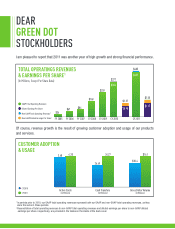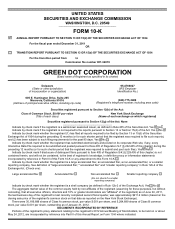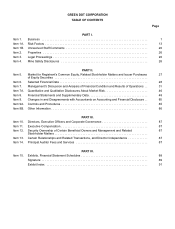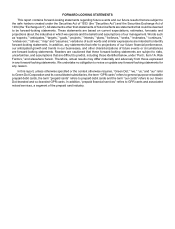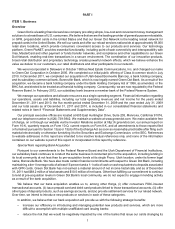Green Dot 2011 Annual Report Download - page 14
Download and view the complete annual report
Please find page 14 of the 2011 Green Dot annual report below. You can navigate through the pages in the report by either clicking on the pages listed below, or by using the keyword search tool below to find specific information within the annual report.4
a cardholder relationship can be established. The GPR cards we offer are issued primarily by Columbus Bank and
Trust Company, a division of Synovus Bank, and, in the case of certain of our co-branded cards discussed below, GE
Capital Retail Bank. Our card issuing program with Columbus Bank and Trust Company will terminate in October 2012,
subject to a 180-day wind-down period, and we have recently initiated the process of transitioning the program to our
subsidiary bank, Green Dot Bank. Card balances are FDIC-insured and have either Visa or MasterCard zero liability
card protection.
Card Products
Green Dot-Branded GPR Cards. Our Green Dot-branded GPR cards provide consumers with an affordable and
convenient way to manage their money and make payments without undergoing a credit check or possessing a pre-
existing bank account. In addition to standard prepaid Visa- or MasterCard-branded GPR cards, we also offer GPR
cards marketed for a specific use or market, such as our Online Shopping card, our Prepaid Student card and our
Prepaid NASCAR card.
To purchase a GPR card in a retail store location, consumers typically select the GPR card from an instore display
and pay the cashier a one-time purchase fee plus the initial amount they would like to load onto their card. Consumers
then go online or call a toll-free number to register their personal information with us so that we can activate their
temporary prepaid card and mail them a personalized GPR card. As explained below, consumers can then reload their
personalized GPR cards using a MoneyPak or, at enabled retailers, via a point-of-sale process, which we refer to as
a POS swipe reload transaction. Funds can also be loaded on the card via direct deposit of a customer’s government
or payroll check.
Our GPR cards are issued as Visa- or MasterCard-branded cards and are accepted worldwide by merchants and
other businesses belonging to the applicable payment network, including for bill payments, online shopping, everyday
store purchases and ATM withdrawals. Visa and MasterCard are each accepted at more than 30 million locations
worldwide. Our cardholders can conduct ATM transactions at approximately 1.9 million Visa PLUS or 1.0 million
MasterCard Cirrus ATMs worldwide, including over 20,000 MoneyPass fee-free ATMs in all 50 states and Puerto Rico.
We have instituted a simple fee structure that includes a new card fee (if the card is purchased from one of our
retail distributors), a monthly maintenance fee (which may be waived based on usage), a cash reload fee and an ATM
withdrawal fee for non-MoneyPass ATMs. Most of the features and functions of our cards are provided without
surcharges. Our free services include account management and balance inquiry services via the Internet, telephone
and mobile applications.
For regulatory compliance, risk management, operational and other reasons, our GPR cards and reload products
have certain limitations and restrictions, including but not limited to maximum dollar reload amounts, maximum numbers
of reloads in a given time period (e.g., per day), and limitations on uses of our temporary cards versus our permanent
personalized cards.
Co-Branded GPR Cards. We provide co-branded GPR cards on behalf of certain retail distributors and other
business entities. Co-branded cards generally bear the trademarks or logos of the retail distributor or business entity,
and our trademark on the packaging and back of the card. These cards have the same features and characteristics
as our Green Dot-branded GPR cards, and are accepted at the same locations. We typically are responsible for
managing all aspects of these programs, including strategy, product design, marketing, customer service and
operations/compliance. Representative co-branded cards include the Walmart MoneyCard, the Kmart Prepaid Visa
and MasterCard cards, the AARP Foundation Prepaid MasterCard and the Meijer Prepaid MasterCard.
Reload Services
We generate cash transfer revenues when consumers purchase our reload services. We offer consumers affordable
and convenient ways to reload any of our GPR cards, over 120 third-party prepaid card programs and to conduct other
cash loading transactions through our reload network, using our MoneyPak product or through retailers’ specially-
enabled POS devices. MoneyPak is offered in all of the retail locations where our GPR cards are sold. MoneyPak is
a cash reload product that we market on a display like our Green Dot-branded GPR cards. Cash reloads using a
MoneyPak involve a two-step process: consumers pay the cashier the desired amount to be reloaded onto the
MoneyPak, plus a service fee, generally ranging between $3.00 and $4.95, and then go online or call a toll-free number
to submit the MoneyPak number and add the funds to a GPR card or other account, such as a PayPal account.
Alternatively, at many retail locations, consumers can add funds directly to their Green Dot- branded and co-branded
cards at the point of sale through a POS swipe reload transaction. Unlike a MoneyPak, these POS swipe reload
transactions involve a single-step process: consumers pay the cashier the desired amount to be reloaded, plus a
service fee, and funds are reloaded onto the GPR card at the point of sale without further action required on the part
of the consumer.


